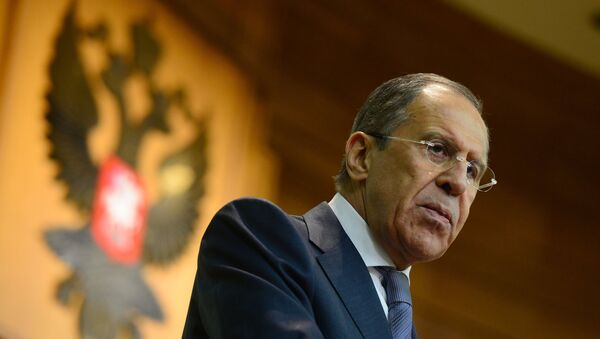MOSCOW, March 29 (RIA Novosti) - Russia has no intentions or interests whatsoever to cross the Ukrainian borders, Foreign Minister Sergei Lavrov said on Saturday.
Lavrov’s remarks during an interview with Rossiya television come in response to Western allegations that Russia has been building up its military contingent near Ukraine in preparation for military intervention in the country.
Lavrov said that rather than shifting the burden of responsibility for the Ukrainian crisis on Moscow and “painting the situation in bright tones and colors,” the West should recognize its own responsibility for the atrocities committed in Ukraine.
The minister said efforts to resolve the Ukrainian standoff “must be collective and sincere.”
Last week, Lavrov said that Russia was collecting “all of the facts that show the lawlessness of neo-nationalists and extremists” as well as on the violence that has racked the country.
He reiterated Russian President Vladimir Putin’s demand to the new Ukrainian government and “their Western patrons” to urgently end lawlessness and violence in the country.
“He [Putin] said that we would defend the rights of Russians and Russian speakers in Ukraine, using the whole arsenal of political, diplomatic and legal means. There’s nothing I can add,” Lavrov said.
Calls for secession have been spreading across Ukraine’s mainly Russian-speaking southeastern regions after Ukrainian ultranationalists, who make up the bulk of the erstwhile opposition, rose to political prominence.
Talk turned to action in Crimea, a predominantly Russian-ethnic peninsula, which voted overwhelmingly to rejoin Russia in a referendum on March 16. The region’s reunification with Russia was finalized last week.
Western powers refused to recognize the results of the Crimean referendum.
The US and EU have imposed sanctions on senior Russian officials, whom they believe assisted Crimea’s reunification bid, and warned Russia of international isolation if tensions over Crimea continue to escalate.
US President Barack Obama threatened Moscow earlier this month with more sanctions targeting key sectors of its economy, should Russia engage in "further incursions into Ukraine.”
“Isolation is a term invented by our Western partners, who are trying to act according to their neo-imperial nostalgic ambitions. When something is done not the way they want it, they immediately trying to grab their “sanctions stick,” but the time for such actions has already passed. They should focus on engaging everyone in joint efforts, not on isolating their partners,” Lavrov said.
Several southeastern Ukrainian regions with large ethnic Russian populations have also refused to recognize the legitimacy of the new government in Kiev and have expressed concern about the appointment of far-right politicians to key posts and a growing frequency of official ultranationalist rhetoric.
The minister said the current crisis in Ukraine is rooted in failure of Kiev authorities to reconcile the interests of the western and south-eastern regions of the country.
“We are convinced that Ukraine needs a deep constitutional reform…and, frankly, we believe that the only path for the sustainable development of the Ukrainian state is the creation of a federate nation,” Lavrov said.
Latest contacts between Russia and the West show the signs of progress in developing a common approach toward finding a diplomatic solution for the Ukrainian crisis, the minister said.
“Our approaches are coming together bit by bit,” he said.
“My latest meeting with US Secretary of State John Kerry in The Hague and my contacts with Germany, France and some other countries show prospects of emerging common initiative that could be offered to our Ukrainian colleagues,” Lavrov continued.
According to the minister, Russia has handed an informal document outlining its vision of Ukraine’s future to the US, EU, China and some other countries, including the BRICS members.
“I can say that federation is no longer a forbidden word in our talks,” Lavrov said. “I am certain that we must insist on it not because it’s our fancy but because it’s a demand put forward by southern and eastern regions [of Ukraine].
“Maybe, someone knows better, and a certain magic formula can be found within the framework of a unitary state. [But] it is very hard to live together in a unitary state when the western, eastern and southern parts [of Ukraine] celebrate different holidays, pay tribute to different heroes, speak in different languages, think differently and tend towards different European cultures,” he continued.
Russia’s top diplomat said that Russia had two main suggestions for Ukraine – federalization and making Russian the country’s second official language.
“I have no idea of why this is incompatible with the basis of the Ukrainian statehood,” he said.




